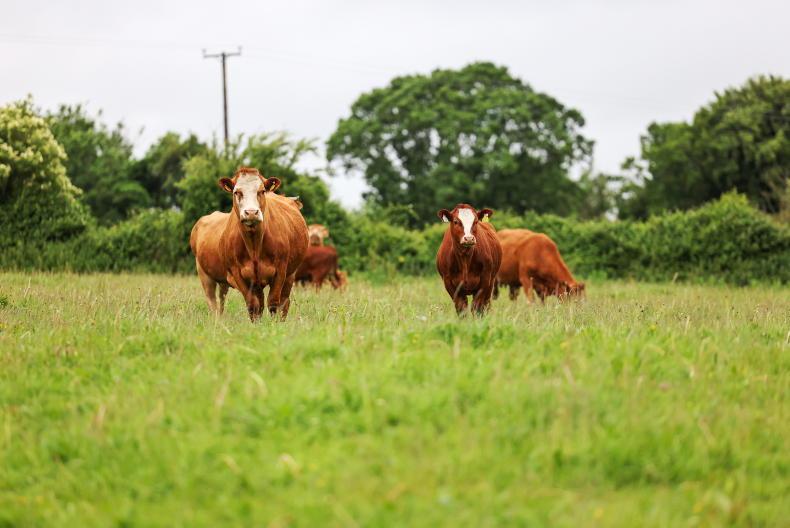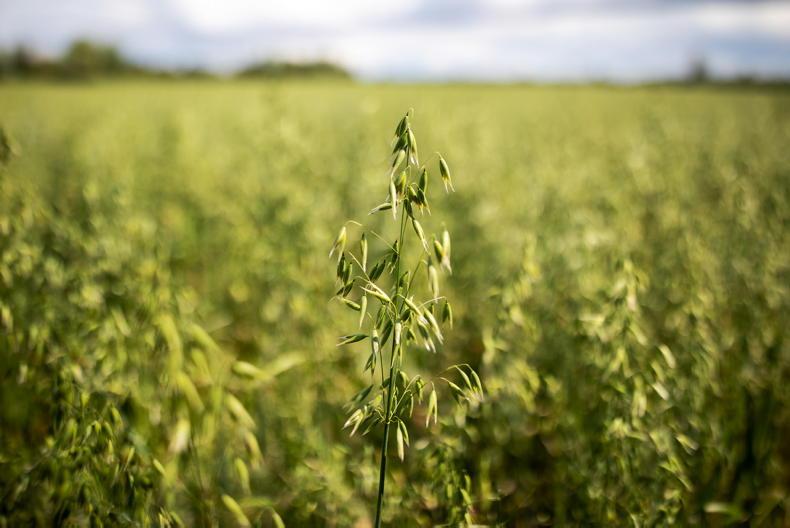The organic sector has set its sights on surpassing €750m in wholesale output by 2030, as growing numbers sign up to the Organic Farming Scheme (OFS), while fewer organic cattle and sheep end up in the conventional supply chain.
That is according to the new strategy for organic farming unveiled at the National Ploughing Championships on Wednesday, which forecasts a threefold increase in the volume of certified organic beef and a sixfold jump in organic lamb by 2030, relative to 2022’s output.
The sector’s current output is estimated to come to €200m.
These growth figures would equate to respective volumes of 12,000t and 3,000t for organic beef and lamb, while the tillage and dairy sectors are anticipated to roughly double their output over the same timeframe.
Achieving these levels of output would require the OFS to hit 8,500 participants by 2030 and for these farms to cover 10% of all farmland in the country, up from only 5% currently.
The document notes that the organic sector is currently “niche and fragmented in many cases”, which results in processing and transport costs higher than those associated with conventional produce.
Addressing leakage
Poor communication networks within the sector see the possibility of a price premium for many organic livestock lost, as farmers sell on store or finished cattle and sheep to non-organic buyers.
It is thought that as many as seven in every 10 lambs born on organic farms are currently slaughtered and marketed as conventional.
The €750m target is based off the sector’s leakage figures dropping to 10% for cattle and below 50% for lamb.
Key priorities for the sector to meet its targets include ensuring organic farmers are supported with payments and advice, bringing co-ordination to the value chain to avoid leakage and growing domestic markets, while also tapping into those overseas.
Farming organisations, Teagasc, processor representatives and certification bodies were among the stakeholders which sit on the forum that compiled the strategy.
Incomes 'central'
Speaking at the launch, Minister for Agriculture Charlie McConalogue maintained that a switch to organics should bring benefits to farm incomes.
“I welcome the focus on ensuring that organic farmers, fishers and food producers are competitive and productive, with enhanced well-being and economic sustainability,” he commented.
“The incomes of our producers are central and critical to the success of our strategy, as they are the bedrock of our world-class organic agri-food sector.”
Minister of State Pippa Hackett labelled the new strategy as “ambitious” in its aim boost he wholesale value of organic output to €750m by 2030.

The strategy looks to address bottlenecks in the organic supply chain, specifically on processing capacity. / Donal O'Leary
This rise in the sector’s economic performance “will ultimately benefit the thousands of Irish farmers who have converted to organics in recent years”.
“A key element of our ambition is to increase organic processing capacity and this year we doubled the support available and increased the grant rate significantly in response to the growing demand for Irish organic produce,” she added at the strategy’s launch.
“Organic farming delivers for climate, water quality, biodiversity and soil; we have made huge strides over the first half of this decade and this Strategy sets out the roadmap to do even more between now and 2030.”
The organic sector has set its sights on surpassing €750m in wholesale output by 2030, as growing numbers sign up to the Organic Farming Scheme (OFS), while fewer organic cattle and sheep end up in the conventional supply chain.
That is according to the new strategy for organic farming unveiled at the National Ploughing Championships on Wednesday, which forecasts a threefold increase in the volume of certified organic beef and a sixfold jump in organic lamb by 2030, relative to 2022’s output.
The sector’s current output is estimated to come to €200m.
These growth figures would equate to respective volumes of 12,000t and 3,000t for organic beef and lamb, while the tillage and dairy sectors are anticipated to roughly double their output over the same timeframe.
Achieving these levels of output would require the OFS to hit 8,500 participants by 2030 and for these farms to cover 10% of all farmland in the country, up from only 5% currently.
The document notes that the organic sector is currently “niche and fragmented in many cases”, which results in processing and transport costs higher than those associated with conventional produce.
Addressing leakage
Poor communication networks within the sector see the possibility of a price premium for many organic livestock lost, as farmers sell on store or finished cattle and sheep to non-organic buyers.
It is thought that as many as seven in every 10 lambs born on organic farms are currently slaughtered and marketed as conventional.
The €750m target is based off the sector’s leakage figures dropping to 10% for cattle and below 50% for lamb.
Key priorities for the sector to meet its targets include ensuring organic farmers are supported with payments and advice, bringing co-ordination to the value chain to avoid leakage and growing domestic markets, while also tapping into those overseas.
Farming organisations, Teagasc, processor representatives and certification bodies were among the stakeholders which sit on the forum that compiled the strategy.
Incomes 'central'
Speaking at the launch, Minister for Agriculture Charlie McConalogue maintained that a switch to organics should bring benefits to farm incomes.
“I welcome the focus on ensuring that organic farmers, fishers and food producers are competitive and productive, with enhanced well-being and economic sustainability,” he commented.
“The incomes of our producers are central and critical to the success of our strategy, as they are the bedrock of our world-class organic agri-food sector.”
Minister of State Pippa Hackett labelled the new strategy as “ambitious” in its aim boost he wholesale value of organic output to €750m by 2030.

The strategy looks to address bottlenecks in the organic supply chain, specifically on processing capacity. / Donal O'Leary
This rise in the sector’s economic performance “will ultimately benefit the thousands of Irish farmers who have converted to organics in recent years”.
“A key element of our ambition is to increase organic processing capacity and this year we doubled the support available and increased the grant rate significantly in response to the growing demand for Irish organic produce,” she added at the strategy’s launch.
“Organic farming delivers for climate, water quality, biodiversity and soil; we have made huge strides over the first half of this decade and this Strategy sets out the roadmap to do even more between now and 2030.”










SHARING OPTIONS